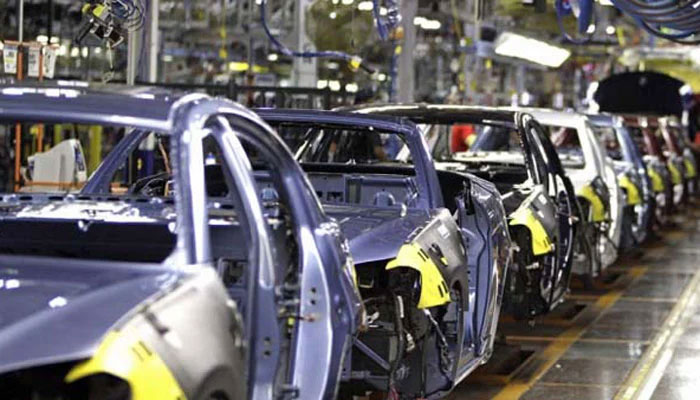Auto parts makers eye new markets, technologies to boost exports
KARACHI: Auto parts manufacturers have a lot of opportunities to diversify their products, enter new markets, and innovate their technologies, according to the speakers at a symposium held on Saturday at the Pakistan Auto Show in Karachi.
The symposium, titled "The Future Drive: Innovations, Exports, Trends, and Way Forward for Auto Parts Manufacturers," featured experts from the industry, academia, and government who shared their insights and recommendations on how to boost the growth of the sector.
Imtiaz Rastgar, an export specialist, said that Pakistan's vendors need to tap into the global market for light engineering and vendor industries, which include orthopedic implants, hardware and building material, the gearbox market, steering wheels, hydraulic pumps, pistons, and more.
Danial Malik, Chief Executive of Master Changan Motors, said Pakistan has one of the lowest motorization ratings in the world, with 17 vehicles per 1,000 people.
"The country needs to have strategic free trade agreements with right-hand drive and completely built unit markets and give incentives and subsidies to grow its auto industry," he said.
Malik also informed that Changan has started exporting vehicles to Kenya from this October, and 14 Oshan X7s have been exported to date.
Aamir Allawala, former chairman of the Pakistan Association of Automotive Parts and Accessories Manufacturers (PAAPAM), said that diversification is a way forward for auto parts manufacturers by expanding operations into new, unrelated products, services, markets, and industries.
He said that the auto parts manufacturers are facing many issues, such as continuous pressure from original equipment manufacturers to reduce cost and prices, erosion of profitability due to cost inflation, profits freezing, and an increase in input costs.
Allawala added that joint ventures with China are a great opportunity for Pakistani businesses in this period of crisis, as China is looking for alternate markets due to increasing labor costs and the imposition of 25 percent duties on "made in China" products by the United States.
He also said that free trade agreements with China offer concessions to Pakistan in the agriculture sector.
Dr. Adil Nakhuda, assistant professor and research fellow at the Institute of Business Administration (IBA), said that there is a need to empower small
and medium enterprises and develop policies to encourage their participation in trade.
Tariq Khan, Senior Director Corporate Strategy and Regulatory Affairs at Indus Motor Company, said that Pakistan does not have tooling capability, so it should develop a few tooling centers.
He said that the aftermarket parts potential is immense, but Pakistan is importing aftermarket parts, so it should make them locally.
Khan also suggested that Pakistan can explore other sectors such as textiles, food processing, cement, plastic, oil, and white goods.
He also mentioned that Saudi Arabia is a potential market where seven top global suppliers have committed huge investments.
The Pakistan Auto Show is an annual event organized by PAAPAM that showcases the latest products and technologies of the automotive industry. The event attracts thousands of visitors from across the country and abroad who are interested in buying or selling vehicles, parts, accessories, or services. The event will conclude on Sunday.
-
 'Too Hard To Be Without’: Woman Testifies Against Instagram And YouTube
'Too Hard To Be Without’: Woman Testifies Against Instagram And YouTube -
 Kendall Jenner Recalls Being ‘too Stressed’: 'I Want To Focus On Myself'
Kendall Jenner Recalls Being ‘too Stressed’: 'I Want To Focus On Myself' -
 Dolly Parton Achieves Major Milestone For Children's Health Advocacy
Dolly Parton Achieves Major Milestone For Children's Health Advocacy -
 Oilers Vs Kings: Darcy Kuemper Pulled After Allowing Four Goals In Second Period
Oilers Vs Kings: Darcy Kuemper Pulled After Allowing Four Goals In Second Period -
 Calgary Weather Warning As 30cm Snow And 130 Km/h Winds Expected
Calgary Weather Warning As 30cm Snow And 130 Km/h Winds Expected -
 Maura Higgins Reveals Why She Wears Wigs On 'The Traitors' And What Her Real Hair Is Like
Maura Higgins Reveals Why She Wears Wigs On 'The Traitors' And What Her Real Hair Is Like -
 Brandi Glanville Reveals Shocking Link Of Facial Issues To Leaking Implants, Claims 'no' Support From Ex Eddie Cibrian
Brandi Glanville Reveals Shocking Link Of Facial Issues To Leaking Implants, Claims 'no' Support From Ex Eddie Cibrian -
 Who Is Rob Rausch’s Girlfriend? 'The Traitors' Winner Linked To Kansas City Woman
Who Is Rob Rausch’s Girlfriend? 'The Traitors' Winner Linked To Kansas City Woman -
 Bobby J. Brown, 'Law & Order' And 'The Wire' Actor, Dies At 62
Bobby J. Brown, 'Law & Order' And 'The Wire' Actor, Dies At 62 -
 Netflix Gives In As Paramount Offers Massive Breakup Fee To Step Away From Warner Bros. Discovery Bid
Netflix Gives In As Paramount Offers Massive Breakup Fee To Step Away From Warner Bros. Discovery Bid -
 Who Won 'Traitors' Season 4? Rob Rausch Claims $220,800 Grand Prize
Who Won 'Traitors' Season 4? Rob Rausch Claims $220,800 Grand Prize -
 Niall Horan Shares Update On New Music On The Way
Niall Horan Shares Update On New Music On The Way -
 Backstreet Boys Member Brian Littrell Refiles Trespassing Lawsuit Against Florida Retiree
Backstreet Boys Member Brian Littrell Refiles Trespassing Lawsuit Against Florida Retiree -
 Kate Middleton Dubbed ‘conscious Shopper’ By Famous Fashion Expert
Kate Middleton Dubbed ‘conscious Shopper’ By Famous Fashion Expert -
 Princess Catherine Joins Volunteers In Newtown During Powys Visit
Princess Catherine Joins Volunteers In Newtown During Powys Visit -
 Shamed Andrew Thought BBC Interview Was ‘time To Shine,’ Says Staff
Shamed Andrew Thought BBC Interview Was ‘time To Shine,’ Says Staff




